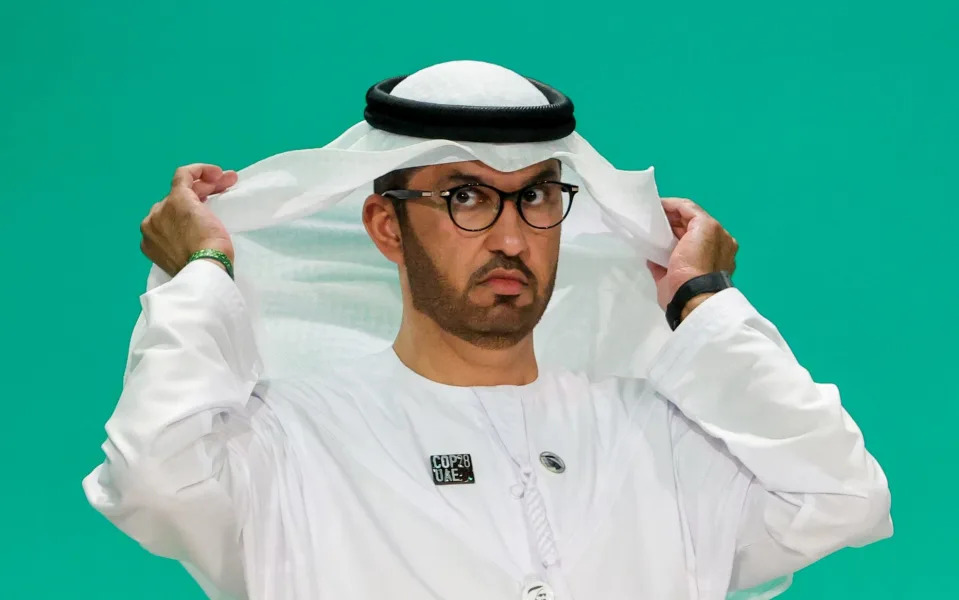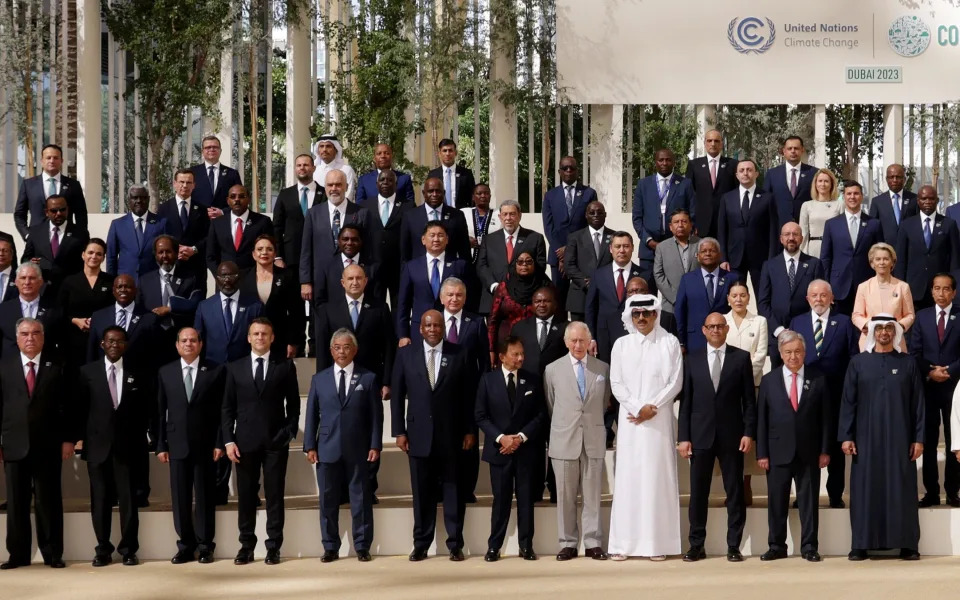Sky News
Updated Sat, 2 December 2023

The nation hosting the COP28 climate summit has had its climate plan downgraded to the lowest category.
The United Arab Emirates' climate plan is now rated "critically insufficient" by Climate Action Tracker (CAT), a consortium of climate analysts and thinktanks.
The group assesses whether countries' plans - known as "nationally determined contributions" (NDCs) - are good enough to fulfil their part of limiting global warming to 1.5C above pre-industrial levels.
Even though the UAE recently ramped up the targets in its plan, the policies to match it were missing, CAT said.
"A country like the UAE with very high per capita emissions and very high GDP per capita, they need to reduce their emissions. That's very clear. And that's currently not happening," said Dr Niklas Hohne, an analyst from New Climate Institute involved in the research, and a professor in cutting emissions.
In October, the UAE's national oil company, ADNOC, awarded contracts worth $17bn (£13bn) for the development of the Hail and Ghasha offshore gas fields, as part of a $150bn (£118bn) fossil fuel expansion plan.
"That's totally counter to what is discussed here [at the climate summit]," said Dr Hohne.
The UAE's COP28 team was not immediately available to comment.
It comes as the UAE's COP presidency team unveiled a slew of announcements on energy it had brokered with governments and industries.
More than 110 countries pledged to triple the world's renewable energy capacity and double energy efficiency by 2030, in a bid to displace demand for fossil fuels.
Meanwhile, more than 20 nations committed to trebling nuclear power, and more than 50 oil and gas companies said they would tackle emissions from their operations.
Click to subscribe to ClimateCast wherever you get your podcasts
Tom Evans from thinktank E3G, which was not involved with the analysis, but is tracking progress in Dubai, said: "For all the flashy announcements made on the stage of COP, when you look closer it's clear that there's much more the UAE needs to do to get its emissions down."
CAT had already rated the UAE's plan "insufficient", the fourth lowest of five categories.
The downgrade was partly due to the analysts filling out missing data about greenhouse gas emissions from air conditioning, relied on by people here in Dubai, where it is currently 30C in winter.
Read more:
Is Dubai playing its part to tackle climate change?
Will COP28 actually change the world?
Is the UK 'fuelling' the climate crisis?
The change was also down to an update in what science says is needed to try to limit global warming to 1.5C - a change that affected other countries' assessments too.
But Dr Hohne said it was "particularly unfortunate" in the case of the UAE because as COP28 president it has a leadership role, "and usually they should really do the right things".
However, he praised the advances the UAE has made, including its investment in renewable power domestically and in dozens of countries abroad, though it is outweighed by the investment in oil and gas.
Other countries rated 'critically insufficient' include fellow major fossil fuel producers like Russia and Saudi Arabia, as well as Turkey, Singapore and Thailand.
Climate summit host UAE to ‘aggressively increase’ oil production, charity says
Emma Gatten
Sat, 2 December 2023

Sultan Ahmed al-Jaber, the president of Cop28, is also head of the state oil firm - GIUSEPPE CACACE/AFP
The UAE’s state oil firm is to ramp up production over the next decade, according to new analysis that comes as the petrostate hosts the Cop28 global climate summit.
The new data came as a key adviser to the climate summit quit because of reports that the UAE planned to use its role as host to push oil and gas deals in meetings with other governments.
The developments underlined the difficult role the UAE has in convincing countries to reach a deal on reducing emissions during the two-week negotiations.
Its state oil firm, Adnoc, which is headed by Cop28 president Sultan Ahmed al-Jaber, is on course to become the second-biggest oil producer in the world by 2050, according to analysis by charity Global Witness, based on data from industry analysts Rystad Energy.
Global Witness said assets operated by Adnoc are projected to produce 35.9 billion barrels of oil between the start of 2023 and the end of 2050, second in terms of volume only to Saudi Aramco’s 100.5 billion barrels.

The group photo at Cop28, which got off to a shaky start - Sean Gallup/Getty
It said the data showed Adnoc was also planning to “aggressively increase its production in the short term”, despite Al-Jaber acknowledging that emissions must drop 43 per cent by 2030 to keep world targets of limiting warming to 1.5C on track.
Adnoc told Global Witness that the analysis was “inaccurate as it does not make any distinction between production capacity and actual production, nor does it reflect the difference between Adnoc’s production, partner production and UAE total production.”
It added that: “The hard truth is that all credible energy outlooks, including those by the International Energy Agency and Rystad, show that both renewable and conventional energy will be required to ensure a just and responsible energy transition.”
The global summit got off to a shaky start last week, after the BBC reported on leaked documents that suggested Al-Jaber was briefed to push oil and gas deals in meetings with governments in the run up to Cop28.
Al-Jaber has dismissed the briefings as “false, not true, incorrect,” and the Cop28 team says the briefings “were not used by Cop28 in meetings”.
But the reports prompted the resignation of Hilda Heine, a member of the main advisory board to the summit and the former president of the Marshall Islands.
Ms Heine said the reports were “deeply disappointing” and would “undermine the integrity of the Cop presidency and the process as a whole,” in a letter to Al-Jaber.
A Cop28 spokesman said: “We are extremely disappointed by Dr Heine’s resignation from the Cop28 Advisory Committee. We appreciated her advice throughout the year and we only wish she would have been with us here in the UAE celebrating the adoption of a fund that will support vulnerable island states and those most affected by climate impacts.
“As the Cop28 president has said, we have been completely clear, open, and honest throughout this process and it is a shame to see unverified reporting affect our team and undermine the world’s best chance to keep 1.5 within reach.”
The UAE saw a further knock to its climate credibility, after it was downrated on its emissions reduction plans to “critically insufficient” by influential think tank Climate Action Tracker. The update came after new estimates of emissions from air conditioning in the country.
The hosts had an early success with the launch of a new fund to compensate developing nations for the loss and damage from climate change, after it pledged $100 million (£79 million). Funding totalled nearly £350 million for the loss and damage fund, including £60 million from the UK.
And on Saturday, the US made a historic pledge to phase out coal power, joining a global agreement first made by the UK in 2017.
But the Cop hosts face a trickier challenge getting to an agreement at the end of the two-week summit on emissions reductions.
The UAE will be under intense scrutiny over the final language on fossil fuels, with many observers fearing it will steer away from language on “phasing out” oil and gas, to the alternative “phasing down”, taken to indicate the continued use of gas with carbon capture technology.
In a message to the conference on Saturday, the Pope called for the “elimination of fossil fuels”, and said “the destruction of the environment is an offence against God.”
Emma Gatten
Sat, 2 December 2023

Sultan Ahmed al-Jaber, the president of Cop28, is also head of the state oil firm - GIUSEPPE CACACE/AFP
The UAE’s state oil firm is to ramp up production over the next decade, according to new analysis that comes as the petrostate hosts the Cop28 global climate summit.
The new data came as a key adviser to the climate summit quit because of reports that the UAE planned to use its role as host to push oil and gas deals in meetings with other governments.
The developments underlined the difficult role the UAE has in convincing countries to reach a deal on reducing emissions during the two-week negotiations.
Its state oil firm, Adnoc, which is headed by Cop28 president Sultan Ahmed al-Jaber, is on course to become the second-biggest oil producer in the world by 2050, according to analysis by charity Global Witness, based on data from industry analysts Rystad Energy.
Global Witness said assets operated by Adnoc are projected to produce 35.9 billion barrels of oil between the start of 2023 and the end of 2050, second in terms of volume only to Saudi Aramco’s 100.5 billion barrels.

The group photo at Cop28, which got off to a shaky start - Sean Gallup/Getty
It said the data showed Adnoc was also planning to “aggressively increase its production in the short term”, despite Al-Jaber acknowledging that emissions must drop 43 per cent by 2030 to keep world targets of limiting warming to 1.5C on track.
Adnoc told Global Witness that the analysis was “inaccurate as it does not make any distinction between production capacity and actual production, nor does it reflect the difference between Adnoc’s production, partner production and UAE total production.”
It added that: “The hard truth is that all credible energy outlooks, including those by the International Energy Agency and Rystad, show that both renewable and conventional energy will be required to ensure a just and responsible energy transition.”
The global summit got off to a shaky start last week, after the BBC reported on leaked documents that suggested Al-Jaber was briefed to push oil and gas deals in meetings with governments in the run up to Cop28.
Al-Jaber has dismissed the briefings as “false, not true, incorrect,” and the Cop28 team says the briefings “were not used by Cop28 in meetings”.
But the reports prompted the resignation of Hilda Heine, a member of the main advisory board to the summit and the former president of the Marshall Islands.
Ms Heine said the reports were “deeply disappointing” and would “undermine the integrity of the Cop presidency and the process as a whole,” in a letter to Al-Jaber.
A Cop28 spokesman said: “We are extremely disappointed by Dr Heine’s resignation from the Cop28 Advisory Committee. We appreciated her advice throughout the year and we only wish she would have been with us here in the UAE celebrating the adoption of a fund that will support vulnerable island states and those most affected by climate impacts.
“As the Cop28 president has said, we have been completely clear, open, and honest throughout this process and it is a shame to see unverified reporting affect our team and undermine the world’s best chance to keep 1.5 within reach.”
The UAE saw a further knock to its climate credibility, after it was downrated on its emissions reduction plans to “critically insufficient” by influential think tank Climate Action Tracker. The update came after new estimates of emissions from air conditioning in the country.
The hosts had an early success with the launch of a new fund to compensate developing nations for the loss and damage from climate change, after it pledged $100 million (£79 million). Funding totalled nearly £350 million for the loss and damage fund, including £60 million from the UK.
And on Saturday, the US made a historic pledge to phase out coal power, joining a global agreement first made by the UK in 2017.
But the Cop hosts face a trickier challenge getting to an agreement at the end of the two-week summit on emissions reductions.
The UAE will be under intense scrutiny over the final language on fossil fuels, with many observers fearing it will steer away from language on “phasing out” oil and gas, to the alternative “phasing down”, taken to indicate the continued use of gas with carbon capture technology.
In a message to the conference on Saturday, the Pope called for the “elimination of fossil fuels”, and said “the destruction of the environment is an offence against God.”
No comments:
Post a Comment